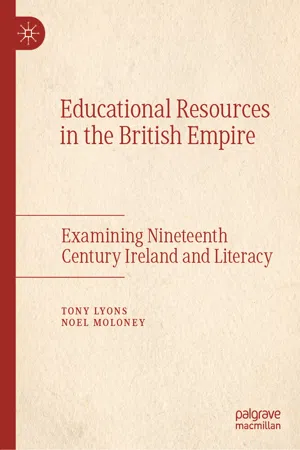Introduction
The Lesson Books of the National Board of Education were first published by its members, the Commissioners for Education. These school texts appealed to school authorities and teachers as they were graded and relatively cheap, and in some instances stocks of books were made available gratis.
Books one to five form the core of the series, with additional supplementary volumes being published from time to time. In all there were about nineteen different levels of book available to the national schools. Also, these books were sold to the public and they formed the basis for training courses for national school teachers.
Pupils were graded according to the level of book they were capable of reading, book one being the easiest to read and book five being the most demanding.
There were seven members of the National Board : three Anglican or Church of Ireland , two Presbyterian , and two Catholic. These seven, generally unpaid, commissioners had overall responsibility for policy regarding the provision for education at primary level: this included the type of curriculum provided in the schools under their remit. Their agents in the field were the inspectors who were appointed by the Board. Teachers were appointed by the local school manager except in the case of Model Schools , where the manager was a school inspector. None of the commissioners had any actual experience as educationalists, apart from James Carlile , who had done some part-time school teaching. Carlile was the only one to receive some payment as he was titled the resident commissioner . All the commissioners had other onerous occupations: the Duke of Leinster could spend little time at national board of education meetings; he was a busy conscientious landlord and was engaged with civic duties; he was also a poor law guardian and a magistrate of petty sessions. Dr. Sadlier, another commissioner , held the following posts at Trinity College Dublin: provost. librarian, senior fellow, senior dean, catechist, Regius professor of Greek, bursar, and Erasmus Smith professor of mathematics; he was also chaplain to the Lord Lieutenant and ecclesiastical commissioner for Ireland. 1 A. R. Blake served as a member of the Treasury: he was also a well-liked merchant and still found time to attend most of the commissioners’ meetings. Robert Holmes worked as a barrister and found little time for education matters. Both archbishops of Dublin, Catholic and Protestant, Murray and Whately , respectively, despite their busy schedules found and inordinate amount of time to participate in education affairs.
The Lesson Books published by the Board were generally well-received both in Ireland and in at least a dozen other countries within the British Empire . Their content was consistent with the authorities’ expectations at the time: the values of social deference, respect for one’s ‘betters’, loyalty and obedience to the State and to officialdom were explicitly promoted in the textbooks. 2
James Carlile was responsible for overseeing the compilation of The First Book of Lessons (along with higher levels of the Books) from his office in Ormond Quay, Dublin.
During the early years of the national education board, Carlile was one of the commissioners who attended the meetings most frequently. 3 He was awarded a Doctorate in Divinity from Glasgow University in 1845. He died at his home in Rathmines, Dublin in 1854 and is buried in Birr, Co. Offaly, where he had ministered for some time.
He was instrumental in compiling Books 1, 2, 4, and 5 of the national board , along with William McCreedy who contributed to Books 1 and 2.
In the preface of the First Book of Lessons , and in a few words, the foundation of not only the EXPLANATORY or INTELLECTUAL method of teaching, but of GOOD READING, is laid. ‘It is recommended to teachers to make their pupils perfectly acquainted with one lesson...
